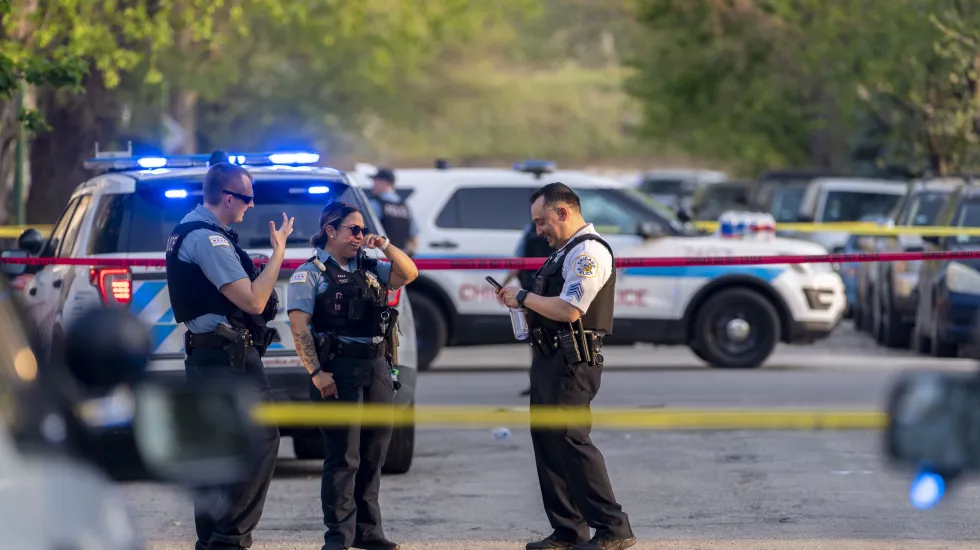
Violence flare-ups in Chicago, especially when the temperatures soar, are never easy to stomach, no matter how frequent.
The bullets showering the South Side in three mass shootings and the gunshots that rang out by “The Bean” downtown earlier this week, injuring a 19-year-old man, were no exception.
Tragically, many of us have grown accustomed to the headlines. But Chicago can never accept the news of one shooting after another. Not when so many of us dread the summer months, wondering if bloodshed is on the way.
No one should have to live with that fear. The crimes that blanketed our city on Tuesday and Wednesday are another bleak reminder that stopping the violence must be leaders’ top priority.
Editorials
Last month, after what was then the most violent weekend of the year, we renewed our plea for a summit where criminal justice experts, law enforcement leaders, community activists and others could convene, all together, to discuss the most effective strategies to keep our communities safer.
We don’t mind sounding like a broken record, if the repeated message could save lives.
Stakeholders, roll up your sleeves, shelve your egos and differences and start talking, together. Now.
Violence is Chicago’s worst scourge. Everyone — low-income, middle class and the wealthiest alike — wants an end to it all.
Take billionaire Ken Griffin, whom we have criticized in the past. But we have to hand it to Griffin, who on Tuesday announced that he will be contributing $25 million to launch two University of Chicago academies that will provide six months of training to police leaders here and elsewhere, and to those who run violence interrupter groups.
Michael Sacks, CEO of GCM Grosvenor, will also be donating an additional $2.5 million in seed money for the schools, which the U. of C. said would cost $75 million, the Chicago Sun-Times’ Frank Main reported.
More training and education for those who deal with high-risk individuals can only help. Police leaders and those from violence intervention groups will share a few classes, and having the two groups become more familiar with each other is a plus too.
It’s telling that on the same day Griffin and Sacks made the announcement, gunfire erupted. It was a harsh tip-off illustrating the difficult task ahead.
By the day’s end, 21 people had been shot. Eleven of those victims were struck in a pair of mass shootings.
In one of the incidents, a 19-year-old man was gunned down and four other teenagers were wounded as little girls played by an open hydrant in Back of the Yards. Five hours later, in Jackson Park, six people were wounded when an argument broke out between two groups who were live-streaming, police said.
Minutes before the second mass shooting, a teenager was shot in the shoulder as he sat in the back of a vehicle on the first block of North Michigan Avenue in the Loop.
It wasn’t the first time violence broke out in the downtown area this month.
Then on Wednesday, two adults and two boys police described as “pre-teens” were injured in a shooting in West Englewood.
Opinion This Week
A weekly overview of opinions, analysis and commentary on issues affecting Chicago, Illinois and our nation by outside contributors, Sun-Times readers and the CST Editorial Board.
Police Supt. David Brown on Wednesday blamed the Back of the Yards shooting on a 28-year-old convicted felon. He also took a dig at the Cook County criminal court system for recently allowing the reputed gang member to be released on a relatively low bail for a weapons charge, despite his violent record.
Brown didn’t say what role the man played in the shooting, but said he’s been behind most of the recent gang violence in the area.
“There needs to be a better risk assessment by judges,” the top cop told reporters. “The police did their job.”
Brown was frustrated, and he has a legitimate point. Cook County is set to get rid of cash bail, but the court system must ensure public safety comes first. Criminal justice reform advocates and law enforcement have to put aside their differences and figure out how to accomplish that.
There are strategies and solutions to tamp down violent crime. They will only work if everyone involved comes together.
Send letters to letters@suntimes.com







